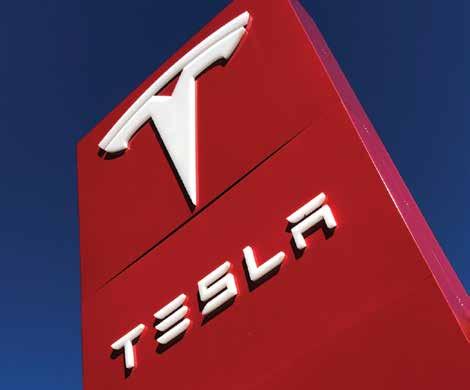
10 minute read
News
Tesla has made a profit from car sales for the first time in almost two years, as it passed $1 billion in quarterly profit for the first time. Overall, Tesla saw $11,98 billion in revenue from April to June this year, with a record net profit for the quarter of $1,14 billion, or $1,02 per share, compared with $104 million or 10 cents a share, a year ago. The company’s revenue surpassed analysts’ expectations, driven by strong sales of its more affordable Model 3 and Model Y vehicles. “Public sentiment and support for electric vehicles seem to be at a never-before-seen inflection point,“ Tesla wrote in its second-quarter letter to investors. The better-than-expected earnings results come amid Tesla’s increased scrutiny in China, the delayed rollout of its revamped Model S sedan and Model X SUV, and the ongoing impact of a global semiconductor shortage and port congestion. Musk noted that the “big struggle“ in the quarter was procuring modules that control the airbags and seat belts in Tesla’s vehicles. “Obviously you cannot ship a car without those and that limited our production severely worldwide in Shanghai and Fremont,“ Musk said. Looking ahead, Tesla continues to expect 50 percent average annual growth in vehicle deliveries, but noted the rate of growth will depend on “equipment capacity, operational efficiency, and the capacity and stability of the supply chain.“
Jeff Bezos momentarily forfeited his title of “richest person on the planet” on July 20 when his Blue Origin spacecraft reached suborbital flight for a few minutes. Now, the multibillionaire is once again without the title, but this time because his net worth actually tumbled — by $13,9 billion in one day. Bezos’ net worth fell because Amazon’s stock price took a hit, sliding 7 percent after the company reported less-than-anticipated second-quarter growth. The drop in Bezos’ net worth allowed for French tycoon Bernard Arnault to claim the No. 1 spot of the ultrawealthy. Arnault heads the luxury goods conglomerate LVMH, whose subsidiaries include Louis Vuitton, Sephora, Moët & Chandon, and Tiffany & Co. He remarkably grew his wealth by nearly $100 billion during the first year of the pandemic. In total, there are 2,755 billionaires worldwide, 86 percent of which are richer than they were a year ago for a combined $5 trillion increase in wealth in 2020.
Advertisement

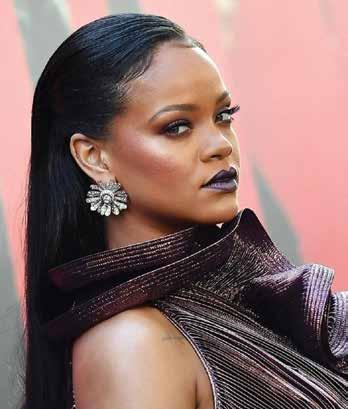
Rihanna is now officially a billionaire and the wealthiest female musician in the world. The pop star is worth $1,7 billion, with an estimated $1,4 billion coming from the value of her cosmetics company. Fenty Beauty — which comes from the singer’s last name — is currently valued at about $2,8 billion, and was founded in 2017 with luxury goods giant LVMH. At the time, she said the aim of the line was to appeal to “every type of woman“ and launched 40 different foundation shades, which at the time was largely unprecedented. It led to the so-called “Fenty Effect“ where rival brands broadened their shade ranges for make-up products. The line brought in more than $550 million in annual revenue in its first year, LVMH said. Rihanna also owns Fenty Skin and the lingerie line Fenty x Savage, which is worth $1 billion. She is second only to Oprah Winfrey as the world’s richest female entertainer. However, earlier this year, the 33-year-old agreed with LVMH to shut down her Fenty fashion label after less than two years in production.
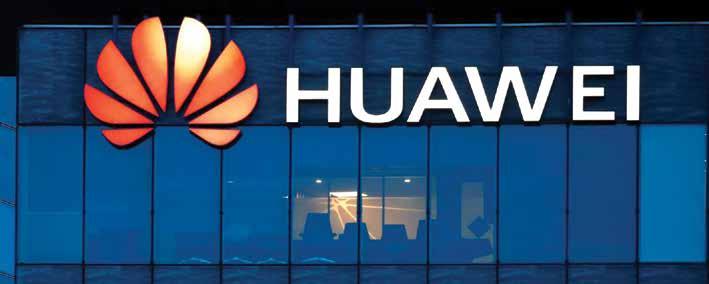
Chinese technology giant Huawei suffered its biggest-ever decline in revenue in the first half of 2021 after the US imposed sanctions that battered its smartphone sales around the world. The drop marks the third straight decline in quarterly revenue for Huawei, the world’s largest maker of telecom equipment and formerly one of the world’s biggest smartphone sellers, and the declines have accelerated since the end of 2020. Huawei’s smartphone sales, once a top revenue driver for the company, have fallen dramatically since the Trump administration imposed restrictions last year blocking the company from buying the most advanced semiconductors. Revenue from telecommunications equipment sales has also dropped, although less dramatically, amid a US campaign pressuring allied countries to drop the Chinese company as a supplier of 5G equipment. Huawei’s priority is to stay resilient in the face of US pressure. “Our aim is to survive, and to do so sustainably,“ said Eric Xu, Huawei’s rotating chairman, in a statement on the results. “We’ve set our strategic goals for the next five years.“ The company started rolling out its Harmony operating system in June, meaning it is no longer wholly reliant on Google’s Android platform.
Virgin Galactic has reopened ticket sales for its space flights at a starting price of $450,000 a seat. It comes after the company, led by billionaire Richard Branson, completed its first fully crewed flight to the edge of space in July. The firm hopes to start commercial flights next year after completing several more test missions. It had previously sold tickets at $250,000 a seat but stopped in 2014 after a fatal accident. In a statement, Michael Colglazier, CEO of the company, said last month’s successful test mission had renewed public interest in the firm’s offer. “Leveraging the surge in consumer interest following the Unity 22 flight, we are excited to announce the reopening of sales effective today,“ he said. “As we endeavor to bring the wonder of space to a broad global population, we are delighted to open the door to an entirely new industry and consumer experience.“ Unlike other private space companies, Virgin Galactic doesn’t launch rockets straight up from the ground. Instead, its spacecraft are flown roughly 50,000 feet up by a special jet. The vehicle then detaches before firing up its rocket boosters and starting a near-vertical ascent. Passengers experience a few minutes of weightlessness before the vehicle glides back to Earth for a runway landing. Roughly 600 people have already purchased tickets worth $200,000-$250,000, Virgin Galactic has said, and another 1,000 have placed deposits for future seats. Tourist flights are set to begin in 2022.

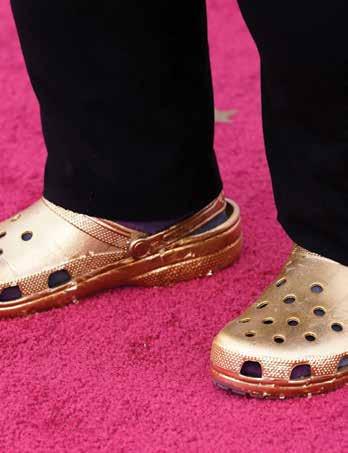
Sales at Crocs soared by 93 percent year-on-year to $641 million, in the company’s second-quarter to 30 June 2021. The shoe brand, which has collaborated with celebrity Justin Bieber, and has been worn by singer Nikki Minaj, reported that revenue growth was strong in all regions: US sales were up by 135,6 percent, Asia-Pacific 27,1 percent and Europe, Middle East, and Africa, rising by 52,6 percent on a constant-currency basis year on year. “We continue to see strong consumer demand for the Crocs brand globally,“ said Andrew Rees, chief executive of the company. “On the back of record second-quarter results and continued momentum, we are raising our full-year 2021 guidance. We are also committing to net zero emissions by 2030, enabling us to provide “comfort without carbon“ to our customers worldwide. I believe we can deliver sustained, highly profitable growth while having a positive impact on our planet and our communities.“ However, the CEO also expressed concern about the short-term impacts of Covid-19 on the shoemaker’s supply. He expects Covid will lead to temporary factory closures in Vietnam, the company’s most significant manufacturing location. Rees told analysts that “global logistics remain challenging and volatile” as the world emerges from the pandemic.

German sportswear company Adidas raised its outlook for full-year sales and profitability as demand soared in most of the world, but took a hit in China where Western brands faced a boycott of their products in late March. Adidas said its confidence was underlined by the planned launch of products such as new versions of its popular NMD sneakers, as well as sports events like the Olympics and the start of the club soccer season in Europe. Currency-neutral sales almost doubled in North America and Europe, Middle East, and North Africa in the quarter, but fell 16 percent in Greater China, in part because the region saw a strong recovery a year ago as it emerged from coronavirus lockdown. Western brands, including Adidas, faced online attacks in China in late March over past statements saying they would not source cotton from Xinjiang after reports of human rights abuses against Uighur Muslims. Beijing denies any such abuses. Adidas said in May it had initially seen a steep drop in demand in China but sales had since recovered slowly but steadily. It did not comment on the tension, beyond referring to the “geopolitical situation”.
Tobacco giant Philip Morris International says it will stop selling cigarettes in the United Kingdom within the next decade — including the company’s iconic Marlboro brand. “It will disappear,“ noted CEO of the company Jacek Olczak. “The first choice for consumers is they should quit smoking. But if they don’t, the second-best choice is to let them switch to the better alternatives.“ The development is part of Philip Morris International’s reinvention as it abandons traditional tobacco products. Olczak became the company’s CEO back in May 2021 and plans to lead the company’s “smoke-free“ transformation. He said the company’s new mission is to find and provide “less harmful alternatives to cigarettes“ to the millions of people who would otherwise still smoke. In May, he said, “Our ambition is that more than half of our net revenues will come from smoke-free products in 2025.“ Philip Morris International is not affiliated with Philip Morris USA, which sells Marlboro in the US, where the brand has more sales than the next seven leading competitors combined. The company’s efforts are part of a much wider societal change in attitudes toward smoking, especially in the United Kingdom. The government recently announced its goal to make England smoke-free by 2030. The UK will be considered “smoke-free“ when the nation’s smoking rates are less than 5 percent.

Levi Strauss & Co. and Beyond Yoga, a fast-growing, premium athletic and lifestyle apparel brand based in the US, announced that they have signed a purchase agreement for the sale of Beyond Yoga to LS&Co. The transaction will be financed with cash and is expected to close during the fourth quarter of 2021, subject to customary closing conditions. Through the acquisition, the American denim company will make its entry into the booming activewear segment after a pandemic year that saw job cuts and weakened sales. Levi Strauss expects the all-cash transaction to add more than $100 million to its net revenue by the end of next year. It plans to expand the mostly digital, size-inclusive Beyond Yoga — which, according to Harmit Singh, the chief financial officer of Levi Strauss, more than doubled its revenue and profitability in the last three years — to a wider, more global audience. Beyond Yoga co-founder, Michelle Wahler will continue as chief executive of Beyond Yoga, a standalone division within the company, and report to Levi Strauss president and chief executive Chip Bergh.
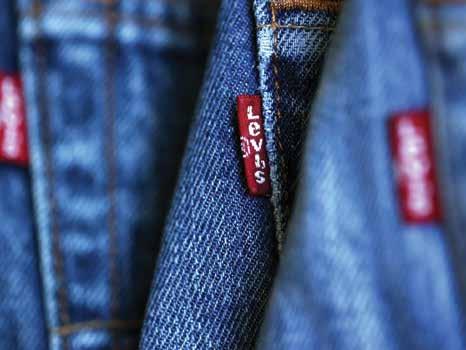

South Park co-creators Trey Parker and Matt Stone have signed a renewal deal that will not only extend their popular show’s run through 2027 but will also see the creation of 14 South Park movies. A new deal with US media giant ViacomCBS Inc. will pay them more than $900 million over the next six years and is one of the richest deals in TV history. “Matt and Trey are world-class creatives who brilliantly use their outrageous humor to skewer the absurdities of our culture and we are excited to expand and deepen our long relationship with them to help fuel Paramount+ and Comedy Central,“ Chris McCarthy of MTV Entertainment and Paramount+ said in a statement. The first two films are set to premiere on Paramount+ later this year, and the streamer plans to roll out two more each year through 2027. The deal with Parker and Stone is the clearest sign yet of ViacomCBS’s growing commitment to Paramount+. The streaming service trails the likes of Netflix and Disney+ but has added millions of subscribers since it rebranded in March. ViacomCBS is looking to the addition of “South Park” movies to accelerate its growth. The series remains the most popular TV show on Comedy Central.










